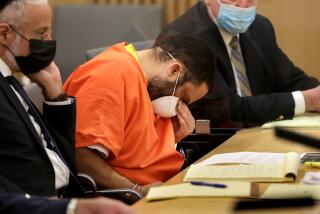Life term for juvenile unconstitutional, state high court rules
- Share via
Sentencing a juvenile offender to 110 years to life in prison for attempted murder is cruel and unusual punishment, the California Supreme Court ruled Thursday, striking down a sentence in a Los Angeles County case.
The state high court’s decision comes as courts across the nation are grappling with the ramifications of a 2010 U.S. Supreme Courtdecision that found it unconstitutional to sentence a juvenile convicted of a crime other than murder to life in prison without parole. In that case, Graham vs. Florida, the court ruled that young offenders should be given “some realistic opportunity” for release, citing “fundamental differences between juvenile and adult minds.”
The California Supreme Court ruled on the case of Rodrigo Caballero, a Palmdale gang member and a diagnosed schizophrenic who in 2007 shot at three rival gang members. Caballero was 16 at the time. One of the victims was struck near a shoulder blade; the other two were uninjured. The teen was convicted of three counts of attempted murder and sentenced to additional prison terms for his use of a firearm in the crime and for his gang affiliation.
Caballero’s sentence fell into a gray area after the U.S. Supreme Court’s decision. Although he was not given a life term without parole, his sentence of 110 years to life had essentially the same effect — he would not become eligible for parole within his expected lifetime.
An appellate court last year upheld his sentence, saying the case fell outside the U.S. Supreme Court ruling.
The California Supreme Court reversed that decision Thursday and found that juveniles such as Caballero should be given the opportunity to show they had matured and to seek release. Although parole may not be appropriate in all cases, to take away that possibility was a violation of the young offenders’ 8th Amendment right against cruel and unusual punishment, they found.
The state “may not deprive them at sentencing of a meaningful opportunity to demonstrate their rehabilitation and fitness to reenter society in the future,” Justice Ming W. Chin wrote.
The justices did not suggest what sentence Caballero and others in his situation should receive. Determining a future parole hearing date should be decided on a case-by-case basis, they wrote, and urged lawmakers to enact legislation establishing a “parole eligibility mechanism” for juveniles with de facto life sentences.
Sue Burrell, an attorney with the Youth Law Center in San Francisco who filed an amicus brief in the case, said statistics from the California Department of Corrections and Rehabilitation suggest the decision would probably directly affect only a small number of cases in the state.
She said, however, that the case was closely watched by juvenile justice experts, who consider it an important part of a larger debate over the importance of a juvenile offender’s age and maturity in deciding an appropriate punishment.
More to Read
Sign up for Essential California
The most important California stories and recommendations in your inbox every morning.
You may occasionally receive promotional content from the Los Angeles Times.











